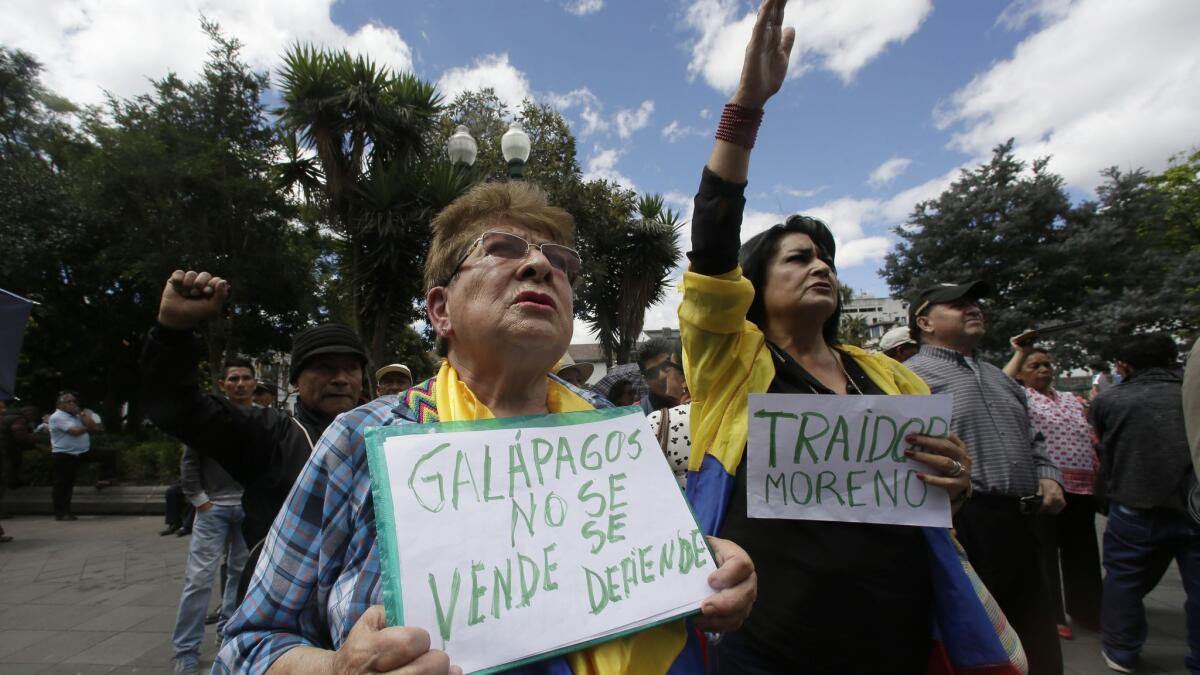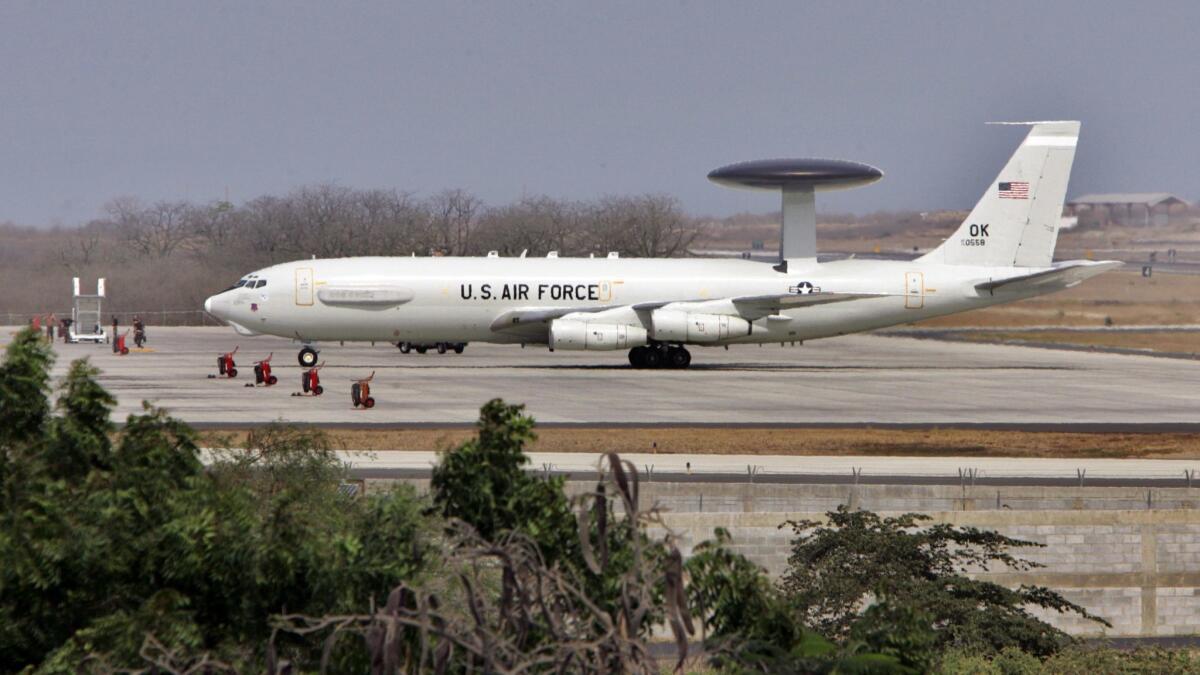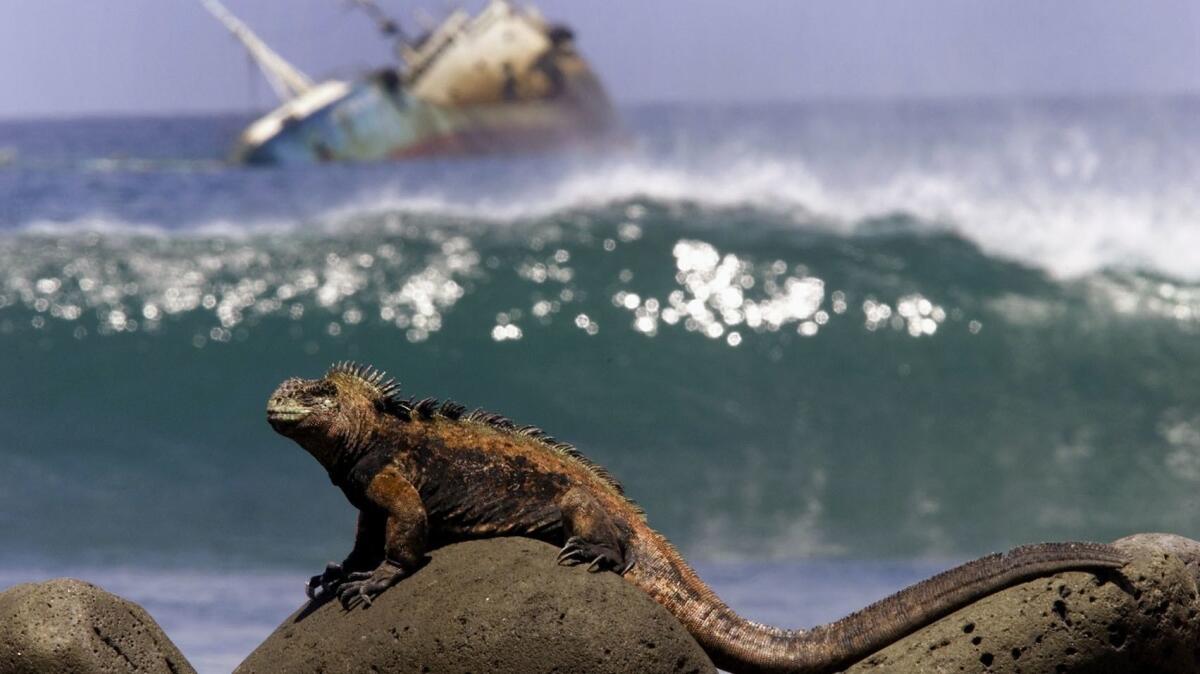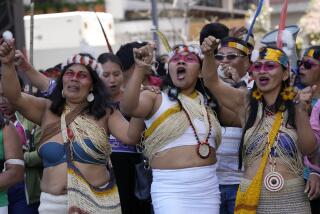Ecuador defends decision to let the U.S. use the Galapagos Islands for anti-drug flights

Reporting from Quito, Ecuador — Ecuador’s defense minister on Monday defended his country’s decision to allow U.S. anti-drug overflights to land in the environmentally sensitive Galapagos Islands, saying the planes will use the landing strips “no more than three days [per month] … in situations of emergency or refueling.”
Critics, however, including former President Rafael Correa, have assailed the plan as an assault on Ecuador’s sovereignty, as well as on the islands’ unique and fragile environment.
“No minister, the Galapagos is not an aircraft carrier for use by gringos,” Correa tweeted last week, addressing Defense Minister Oswaldo Jarrin. “It is an Ecuadorean province that is the patrimony of humanity. That your vassal’s soul reaches this extreme describes very well the government you represent.”
Critics described the agreement as allowing the United States to open a military base on the Galapagos, best known as the inspiration for Charles Darwin’s theory of evolution. The islands are home to plant and animal species found nowhere else.
Jarrin, however, speaking at a university conference in Quito, the capital, denied that the presence of the U.S. aircraft, including a Boeing Airborne Early Warning and Control System and Lockheed P-3 Orion surveillance plane, will convert the San Cristobal island airport into a U.S. air base. Changes to the airport will include a lengthening of a runway, however.
Jarrin said attempts to characterize it as a U.S. base were acts of “bad faith” by political opponents of President Lenin Moreno, who is allowing the U.S. to resume flights that previously operated out of Manta, on the coast of the Ecuadorean mainland. Correa prohibited the flights in 2009, saying they were an affront to Ecuador’s sovereignty.

Several Latin American nations, including Colombia, Peru and Panama, permit basing of U.S. anti-drug overflights operated by the Drug Enforcement Administration. Ecuador signed the new agreement with the U.S. last year, but it was detailed only at a little-noticed news conference in April.
Jarrin said on Monday that the permission is not comparable to the prior arrangement at Manta, which gave U.S. aircraft use of a dedicated air base. The San Cristobal airport is already in use as a tourist hub. The resumption of overflights demonstrates Ecuador’s commitment to the war on drugs and to stopping illegal fishing, Jarrin said.
Much of the cocaine produced in Colombia that is headed for North America departs from the Ecuadorean coastline hidden in fishing boats and submarine-like vessels. U.S. officials have stepped up monitoring of Ecuadorean ship traffic as a result.
But in announcing the decision last week to allow the DEA to resume the flights after a 10-year suspension, Jarrin used an image that caused confusion and outrage.
“I’ve mentioned that the Galapagos are for Ecuador like an aircraft carrier, a natural aircraft carrier, because they guarantee us permanence, resupply, facilities for interception and [are] 1,000 kilometers from our coast,” Jarrin said.
That prompted the denunciation by Correa, a left-leaning ally of the late Venezuelan President Hugo Chavez and a harsh U.S. critic who currently lives in Belgium.
Moreno and Correa were once political allies but have become bitter enemies since Moreno took office in 2017. Moreno blames his predecessor for leaving the country indebted to China to finance his ambitious social and infrastructure programs. Correa accuses Moreno of wrecking an economy that he left in good shape.
Onetime popular president eyed a return to power. Ecuador voters had other ideas »
Benito Bonilla, spokesman for the Quito-based environmental group Pachamama, said the Galapagos should not be used for their “strategic military value.”
“It was in the Galapagos that Darwin developed his theory of human evolution, and not Sun Tsu his book ‘Art of War,’” Bonilla said. “We believe that the priorities of the Ecuadorean government are poorly focused.”

Jarrin, he added, “is not taking to account that the ecosystem of the islands is one of extreme fragility.”
The Galapagos Islands have been given the special “patrimony of humanity” designation by the United Nations cultural agency, UNESCO. About 250,000 tourists from around the globe visit the islands annually to see the unique wildlife and plant varieties.
The transport of fuel to the Galapagos for airplanes and electric power generation has come under criticism from UNESCO, especially after two loads of fuel were accidentally dumped on Isabela Island during transport by ship from the mainland about 600 miles away.
After threats from UNESCO that it might withdraw the “patrimony of humanity” designation unless Ecuador turned Isabela Island’s power plant into a more eco-friendly system, the government last year switched to solar energy and biofuels, eliminating the transport of fossil fuels and the risk of spills.
Special correspondents Jaramillo Viteri and Kraul reported from Quito and Bogota, Colombia, respectively.
More to Read
Sign up for Essential California
The most important California stories and recommendations in your inbox every morning.
You may occasionally receive promotional content from the Los Angeles Times.










